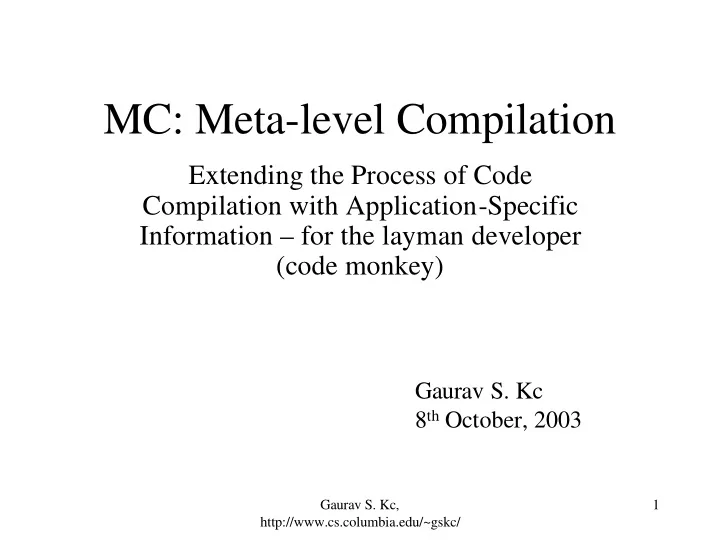

MC: Meta-level Compilation Extending the Process of Code Compilation with Application-Specific Information – for the layman developer (code monkey) Gaurav S. Kc 8 th October, 2003 Gaurav S. Kc, 1 http://www.cs.columbia.edu/~gskc/
Outline • Dawson Engler • Overview of the Compilation Process • Meta-level Compilation – early days with MAGIK – current incarnation: MC – good for detecting bugs: » NULL pointer misuse » memory leak (failure to deallocate memory) » memory corruption (illegal use of deallocated memory) » security holes (buffer overflow, formatstring vulnerabilities) • Conclusions Gaurav S. Kc, 2 http://www.cs.columbia.edu/~gskc/
Dawson Engler • The man behind MAGIK and MC • PhD from MIT '98 • Stanford Faculty (Metalevel Compilation Group) – http://metacomp.stanford.edu “The goal of the Meta-level Compilation (MC) project is to allow system implementors to easily build simple domain- and application-specific compiler extensions to check, optimize, and transform code.” – Publications on MC at OSDI, PLDI, SOSP, Oakland Symposium, ACM CCS • Coverity.com: commercialised MC Gaurav S. Kc, 3 http://www.cs.columbia.edu/~gskc/
Compilers • S/W lifecycle phases – Requirements engineering – Design, and implementation – Repeat, and maintain • Compilation phases – Pre-process ( cpp ) : macro processing – Compiler proper ( cc1 ) – front end synthesis: source � IR, symbol table, control-flow, data-flow – middle end optimisation: IR � IR – back end generation: IR � optimised machine assembly – Assembler ( as ): assembler macro processing, translate ASCII instructions into binary machine code – Linkage editor ( ld ): combine several object modules (and library files) to produce static or dynamically-linked executables Gaurav S. Kc, 4 http://www.cs.columbia.edu/~gskc/
Meta-level Compilation • Static information generated by the front-end synthesis phase is lost after compilation • Application-specific compiler extensions & optimisations can benefit from this information – Compiler developer cannot anticipate all possible domain-specific extensions – Application writer doesn't want to learn compiler internals • Need: Simpler mechanism for coding application- specific extensions for integration into compiler Gaurav S. Kc, 5 http://www.cs.columbia.edu/~gskc/
MC Paper: Incorporating Application Semantics and Control into Compilation Dawson R. Engler, First Conference on Domain Specific Languages, 1997 • Programmers can be active users of compilers • Incorporate domain-specific extensions into the compilation process • Facilitate previously impossible “application-level” optimisations and semantic-checking (dereference NULL ) • Leave application source code unmodified – Source-level (IR) modifications for portable user extensions – Full compiler optimisations on modified IR • Leave compiler source code unmodified – Extensions will be exhibit "built-in" behaviour in compiler Gaurav S. Kc, 6 http://www.cs.columbia.edu/~gskc/
magik: An ANSI-C api to LCC IR • Dynamically linked into modified LCC compiler • User extensions: – Code: invoked at every function definition – Data: invoked at every struct definition • Examples: – Automatically replace a poly-typed function ( output ) with printf and appropriate format-string output("i = ", i, ", j = ", j) printf("%s%d%s%d", "i = ", i, ", j = ", j) – Mandatory checking of return codes for system calls read(fd, buffer, size) if (0 > read(fd, buffer, size)) error("failed system call <read>\n") Gaurav S. Kc, 7 http://www.cs.columbia.edu/~gskc/
magik: illustration Replace poly-typed function with printf equivalent foreach function-call ( "output" ) foreach function-argument ( = arg ) switch argument-type ( arg ) { case Integer: strcat ( typestring , "%d" ); break; case Pointer: if rawPointerType ( arg ) == CHAR strcat ( typestring , "%s" ); else strcat ( typestring , "0x%p" ); break; } replace-call ( function-call, "printf" ) insert-argument (function-call, typestring ) Gaurav S. Kc, 8 http://www.cs.columbia.edu/~gskc/
MC Paper: Checking System Rules Using System-Specific, Programmer-Written Compiler Extensions Operating Systems Design and Implementation, 2000 • System rules for Operating System Kernel – Kernel sanitises user-space data before accessing it ( do X before Y ) – A lock must have a corresponding unlock on every code path ( when X, do Y ) • Peer reviews for manual inspection of source code: not rigorous, human error. • Automated enforcing of system rules – Testing: time-consuming, not exhaustive since complexity/size scale with system size. Impractical to test all device drivers for Linux – Formal Verification: model checkers, theorem provers/checkers to validate consistency of abstract specification of system. Hard to accurately represent system in specifications: over-simplification, omission of features, unless generating code from specs • Compiler-based static analysis tools are useful – No scalability problem. Works directly on source code – System rules have straightforward mapping to source code – Rules are enforced as new phases in the compilation Gaurav S. Kc, 9 http://www.cs.columbia.edu/~gskc/
metal: A high-level, state machine language • yacc -like specification for SM: matched patterns in source code causes transitions between different states • Linkable object code compiled from metal specifications using mcc . • Dynamically linked into compiler, xg++ (based on GNU g++ , working on gcc version) • SM is applied down all possible control-flow paths for each function Gaurav S. Kc, 10 http://www.cs.columbia.edu/~gskc/
MC / metal: illustration Ensure corresponding sti (re-enable interrupts) for every cli sm check_interrupts { // Patterns pattern enable = { sti(); }; pattern disable = { cli(); }; // States and transitions / actions is_enabled : disable ==> is_disabled | enable ==> { error( "double enable" ); } ; is_disabled: enable ==> is_enabled | disable ==> { error( "double disable" ); } | $end-of-path$ ==> { error( "exit w/ intr" } ; } Gaurav S. Kc, 11 http://www.cs.columbia.edu/~gskc/
Other MC / metal checks • Make the kernel check user-space pointers before de-referencing (applicable to library interfaces) • For states { unknown, null, not_null, freed }, find when pointers are used: • before being checked • on NULL paths • after being free ’d • Find double-free errors • Find error paths (returning a negative value) that don’t free allocated memory • Cannot handle multi-threaded applications Gaurav S. Kc, 12 http://www.cs.columbia.edu/~gskc/
Conclusions • Meta-level compilation • New phases for user-extensible compiler • Domain-specific checks for – locating application bugs – enforcing system rules – … • Compiler experience required Gaurav S. Kc, 13 http://www.cs.columbia.edu/~gskc/
Recommend
More recommend